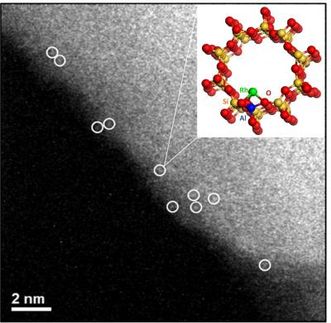BASF invests in third plant for specialty zeolites used for the production of mobile emissions catalysts
New plant in Ludwigshafen, Germany, will double BASF’s global specialty zeolites production capacity
BASF invests in another production plant for specialty zeolites at its Ludwigshafen, Germany, headquarters site. These specialty zeolites will be used to produce state-of-the-art emissions catalysts for heavy duty and light duty diesel vehicles. Due to an increasingly high demand for these catalysts, BASF is investing in this new plant. Production is scheduled to begin in 2019. Another plant in Ludwigshafen started production in 2014. On September 20, the site celebrated a topping-out ceremony for the new plant. It will make BASF one of the largest producers of specialty zeolites worldwide.

At 83 meters high, the new plant for specialty zeolites will become one of the highest buildings at the BASF site in Ludwigshafen. It will double BASF’s global specialty zeolites production capacity.
BASF SE
“Our new specialty zeolites plant is a cornerstone for our long-term growth strategy for our mobile emissions catalysts business,” said Kenneth Lane, President of BASF’s Catalysts division. “This investment will allow us to strengthen the reliable supply for our production of leading-edge diesel emissions catalysts solutions for our customers in the heavy duty diesel, but also the light duty diesel industry.”
At 83 meters (272 feet) high, the new plant will become one of the highest buildings at the BASF site in Ludwigshafen. “This investment continues to take the path of strengthening and expansion at the site in Ludwigshafen and clearly shows the advantages of the Verbund site,” said Dr. Uwe Liebelt, President European Site and Verbund Management. Approximately 25 new jobs will be created.
New regulations worldwide require more sophisticated emissions catalysts systems and are the main driver for the rising demand. In addition, BASF specialty zeolites can support applications in the chemical, petrochemical and refining sectors.
Most read news
Other news from the department manufacturing

Get the chemical industry in your inbox
By submitting this form you agree that LUMITOS AG will send you the newsletter(s) selected above by email. Your data will not be passed on to third parties. Your data will be stored and processed in accordance with our data protection regulations. LUMITOS may contact you by email for the purpose of advertising or market and opinion surveys. You can revoke your consent at any time without giving reasons to LUMITOS AG, Ernst-Augustin-Str. 2, 12489 Berlin, Germany or by e-mail at revoke@lumitos.com with effect for the future. In addition, each email contains a link to unsubscribe from the corresponding newsletter.





























































